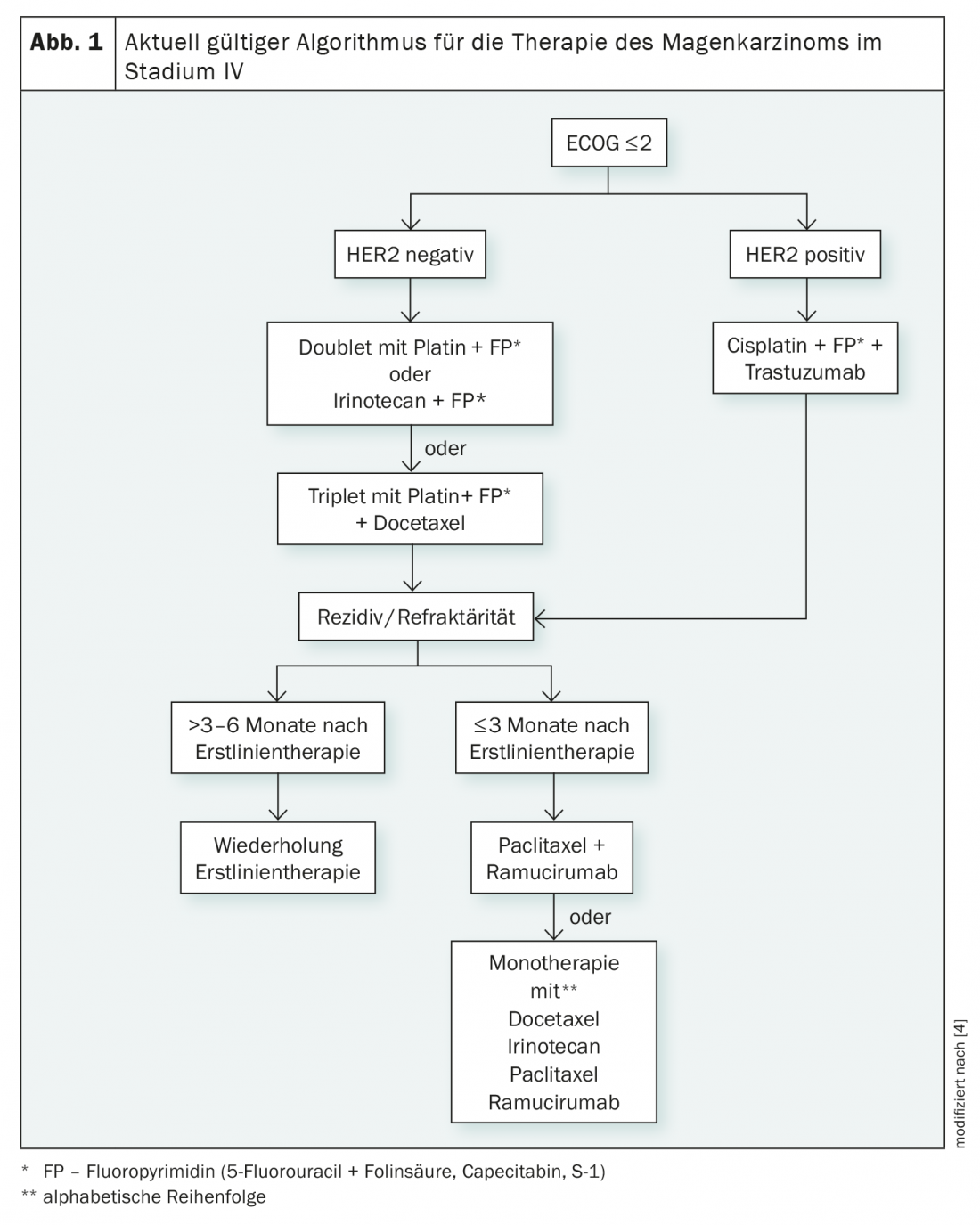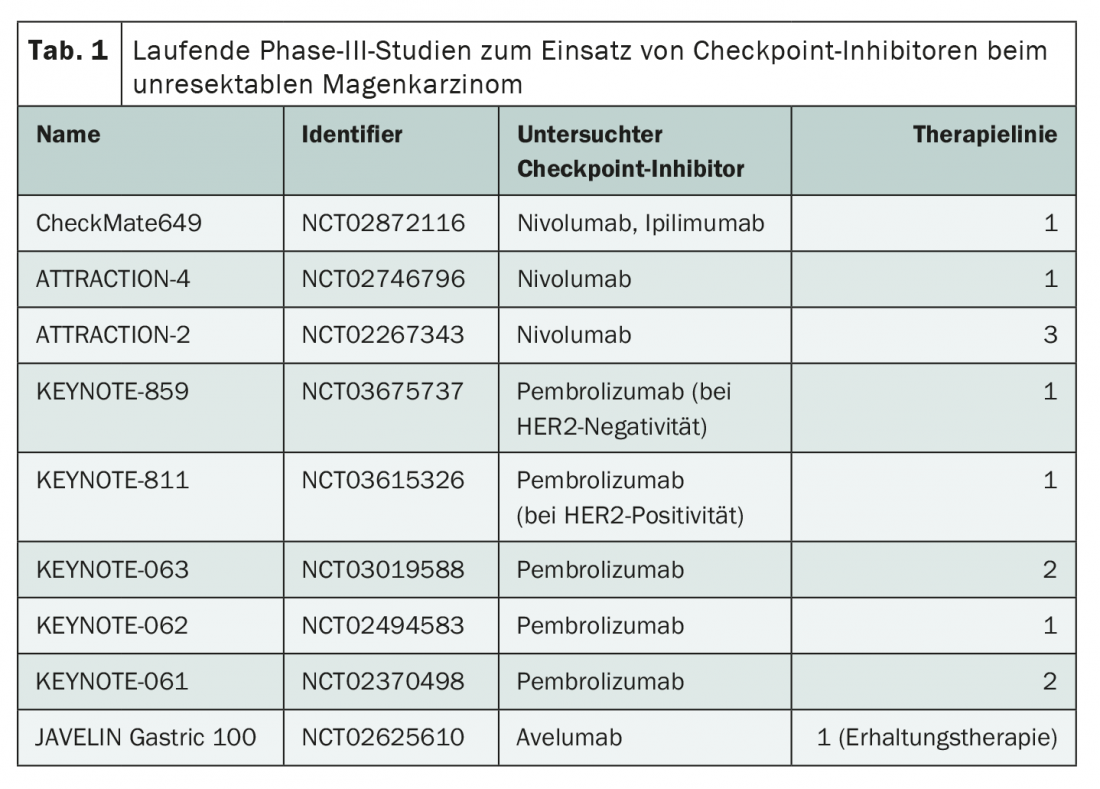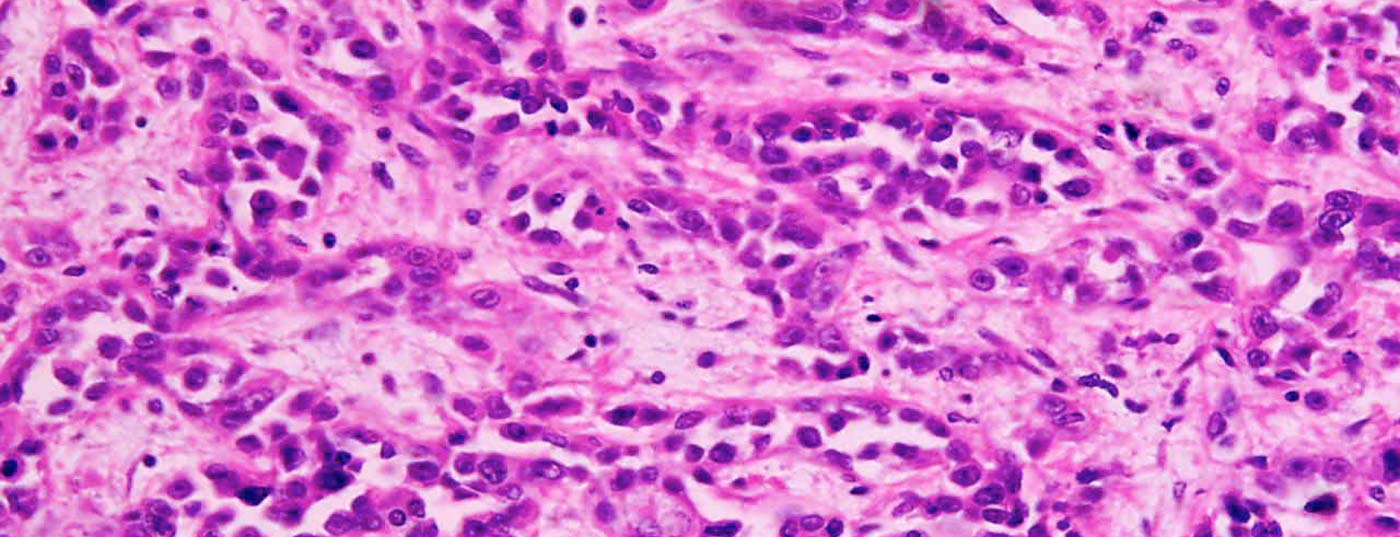The prognosis of advanced gastric carcinoma remains extremely unfavorable. Accordingly, new treatment approaches are urgently needed. Current evidence suggests that checkpoint inhibitor therapy may become more important in the near future.
To date, checkpoint inhibitor therapy for gastric cancer has only been approved in Switzerland in advanced cases. For example, the approval for nivolumab is limited to third-line therapy and that for pembrolizumab is limited to the treatment of metastatic tumors with high microsatellite instability (MSI-H) or defective DNA mismatch repair (dMMR) without alternative therapeutic options [2]. Results from various studies now give reason to hope that these indications will soon be expanded.
State of affairs
Until now, stage IV gastric cancer has been the domain of chemotherapy (Fig. 1) . Although chemotherapy improves survival time compared with purely supportive treatment, it only improves survival by about 6.7 months [3]. An additional month can be gained by using chemotherapy combinations, but these also carry increased toxicities [3]. Doublet chemotherapies based on platinum and a fluoropyrimidine are the recommended standard, and the benefit of triplet combinations is controversial [4].

While targeted therapies are available for HER2-positive tumors, this option does not currently exist for HER2-negative cases. The addition of trastuzumab to chemotherapy results in an increase in response rate and progression-free and overall survival in HER2-positive tumors, which account for 10-15% of gastric cancers. The effect is detectable, with an increase in median survival of just over two months, but small [5]. So we are far from a cure, regardless of HER2 status.
If first-line chemotherapy with or without trastuzumab fails, the antibody ramucirumab directed against VEGFR-2 (vascular endothelial growth factor receptor 2) can be used. This causes a prolongation of survival by about 1.5 months compared to placebo [6]. Alternatively, chemotherapy is also possible in the second line. Their outcomes are comparable to those of treatment with ramucirumab. The best results can be achieved by combinations of paclitaxel and the anti-VEGFR-2 antibody [4].
With regard to all other lines of therapy, there are currently no clear guidelines. Options include ramucirumab, chemotherapy, trifluridine/tipiracil (TAS-102), and various checkpoint inhibitors. Thus, in addition to improving therapeutic options for first- and second-line treatment of stage IV gastric cancer, the goal is to establish a therapeutic standard for the third line over the course of the next few years.
Checkpoint inhibitors as an option
Not only could checkpoint inhibitors soon play a major role in such a third-line standard of care, but they could also be used to complement options at earlier stages of treatment. Various studies are currently underway to test the use of nivolumab, pembrolizumab and others in all lines of therapy (Tab. 1). The results so far indicate that treatment with checkpoint inhibitors is at least not inferior to chemotherapy. For example, the KEYNOTE-062 trial reported comparable efficacy of the PD-1 blocker pembrolizumab as first-line monotherapy, with significantly better tolerability [7]. It seems important to consider different subgroups in the efficacy analysis. With high PD-L1 expression, there was a clear trend toward longer overall survival with pembrolizumab treatment.

The results of numerous other studies on the use of checkpoint inhibitors in first-line therapy are pending, but interesting insights have been provided at various 2020 congresses. At the European Society of Medical Oncology (ESMO) Congress, Markus Moehler presented the first promising data from the CheckMate649 study, which includes 1581 patients [8]. Compared with chemotherapy alone, PD-L1 expression with additional administration of nivolumab showed a significant improvement in overall survival and progression-free survival. A smaller – also significant – effect was also present in the overall group.
In addition, preliminary findings were presented from the ATTRACTION-4 trial, which is also evaluating the addition of nivolumab in the first-line setting, but in 724 exclusively Asian patients [9]. Narikazu Boku reported a significant increase in progression-free survival as well as response rate with the addition of nivolumab to chemotherapy. However, overall survival was not significantly prolonged according to this initial analysis.
While the additional administration of immunotherapeutics is usually investigated for first-line therapy, checkpoint inhibitor therapy alone is also under discussion in later lines. For example, a significant improvement in prognosis has already been observed with the use of nivolumab in third-line therapy in the ATTRACTION-2 trial. Median survival was increased from 4.14 to 5.26 months [10].
A look into the future
Although longer-term data remain to be seen, the use of immunotherapeutics in advanced gastric cancer is a valid option. In the meantime, numerous large studies on this approach are underway, some of which have already produced results – some of which are hopeful. The administration of checkpoint inhibitors may soon be routine in the first-line treatment of unresectable gastric cancer, especially in cases of PD-L1 expression and as an adjunct to standard chemotherapy. In later lines of treatment, the use of immunotherapeutics alone is also under discussion, which has been shown to be superior to placebo administration. Overall, the tolerability seems to be superior to that of chemotherapies.
Identification of appropriate biomarkers would facilitate selection of the right patients for immunotherapy. This topic, which also affects numerous disease patterns beyond gastric carcinoma, will probably be with us for a long time to come. Promising candidates currently include expression of PD-L1 in tumor and stroma (combined positivity score), Epstein-Barr virus association, and microsatellite instability [11,12]. A number of studies are currently underway on this as well.
While many questions remain, such as the exact application, the ideal patient selection and also the efficacy itself. Nevertheless, it may soon be impossible to imagine gastric cancer treatment without immunotherapy, provided that its approval is extended. Based on the data available so far, a major breakthrough cannot be expected, but small steps in the right direction are within reach.
Literature:
- Smyth EC, et al: Gastric cancer: ESMO Clinical Practice Guidelines for diagnosis, treatment and follow-up. Annals of Oncology. 2016; 27: v38-v49.
- swissmedic Drug Information. www.swissmedicinfo.ch (last accessed on 17.01.2021)
- Wagner AD, et al: Chemotherapy for advanced gastric cancer. Cochrane Database Syst Rev. 2017; 8: CD004064.
- Lordick F, et al: Onkopedia – Gastric Carcinoma. www.onkopedia.com/de/onkopedia/guidelines/magenkarzinom (last accessed Jan 17, 2021).
- Bang YJ, et al: Trastuzumab in combination with chemotherapy versus chemotherapy alone for treatment of HER2-positive advanced gastric or gastro-oesophageal junction cancer (ToGA): a phase 3, open-label, randomised controlled trial. Lancet. 2010; 376(9742): 687-697.
- Fuchs CS, et al: Ramucirumab monotherapy for previously treated advanced gastric or gastro-oesophageal junction adenocarcinoma (REGARD): an international, randomised, multicentre, placebo-controlled, phase 3 trial. Lancet. 2014; 383(9911): 31-39.
- Shitara K, et al: Efficacy and Safety of Pembrolizumab or Pembrolizumab Plus Chemotherapy vs Chemotherapy Alone for Patients With First-line, Advanced Gastric Cancer: The KEYNOTE-062 Phase 3 Randomized Clinical Trial. JAMA Oncol. 2020; 6(10): 1571-80.
- Moehler M, et al: Nivolumab (nivo) plus chemotherapy (chemo) versus chemo as first-line (1L) treatment for advanced gastric cancer/gastroesophageal junction cancer (GC/GEJC)/esophageal adenocarcinoma (EAC): First results of the CheckMate 649 study. Annals of Oncology. 2020; 31: S1142-1215.
- Boku N, et al: Nivolumab plus chemotherapy versus chemotherapy alone in patients with previously untreated advanced or recurrent gastric/gastroesophageal junction (G/GEJ) cancer: ATTRACTION-4 (ONO-4538-37) study. Annals of Oncology. 2020; 31: S1142-1215.
- Chen L-T, et al: A phase 3 study of nivolumab in previously treated advanced gastric or gastroesophageal junction cancer (ATTRACTION-2): 2-year update data. Gastric cancer: official journal of the International Gastric Cancer Association and the Japanese Gastric Cancer Association. 2020; 23(3): 510-519.
- Shitara K, et al: Pembrolizumab versus paclitaxel for previously treated, advanced gastric or gastro-oesophageal junction cancer (KEYNOTE-061): a randomised, open-label, controlled, phase 3 trial. Lancet. 2018; 392(10142): 123-133.
- Kim ST, et al: Comprehensive molecular characterization of clinical responses to PD-1 inhibition in metastatic gastric cancer. Nat Med. 2018; 24(9): 1449-1458.
- ClinicalTrials.gov. www.clinicaltrials.gov (last accessed on 17.01.2021)
InFo ONCOLOGY & HEMATOLOGY 2021; 9(1): 18-19.











